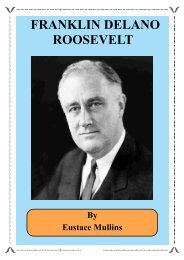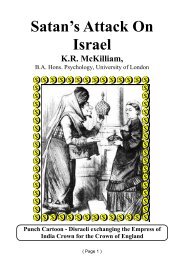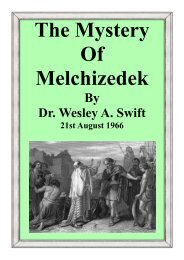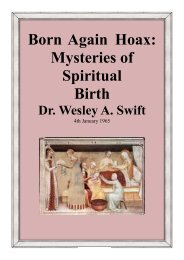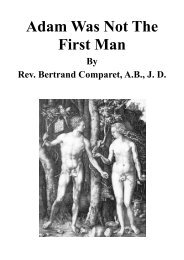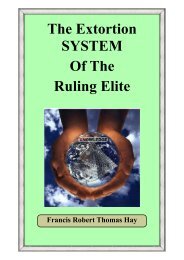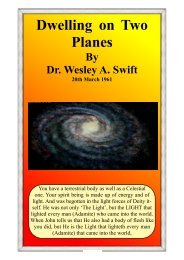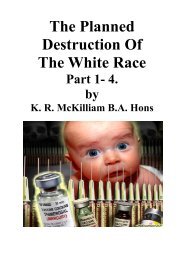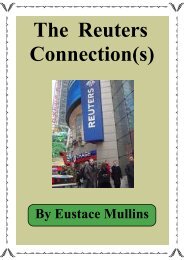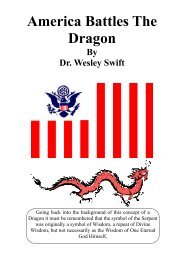Curse of Cannan - The New Ensign
Curse of Cannan - The New Ensign
Curse of Cannan - The New Ensign
You also want an ePaper? Increase the reach of your titles
YUMPU automatically turns print PDFs into web optimized ePapers that Google loves.
each; this gave him complete control <strong>of</strong> that body. His assistant in this bribery was William A.<br />
Glasgow, Jr., the chief counsel for the Norfolk and Western Railway. Martin's chief ally in<br />
controlling the state legislature was his able assistant, Senator Hal Flood, grandfather <strong>of</strong> Senator<br />
Byrd. With such political prospects before him, young Harry Byrd left school at the age <strong>of</strong> fifteen.<br />
In 1919, Martin died, and Byrd took over the machine. He ruled it with an iron hand for more<br />
than half a century. Politically, Byrd had access to all the funds he needed to control the state,<br />
that is, the political slush funds which Rothschild agents routinely dispensed throughout the<br />
United States to maintain their control <strong>of</strong> the nation. <strong>The</strong> funds came from Kuhn, Loeb Co. in<br />
<strong>New</strong> York, the largest banking house handling Rothschild investments in America. Byrd had<br />
been born in Martinsburg, West Virginia; a classmate there had been one Lewis Lichtenstein<br />
Strauss. Strauss later became an itinerant shoe salesman. With the advent <strong>of</strong> World War I, he<br />
suddenly showed up in Washington as "secretary" <strong>of</strong> the U. S. Food Administration, being named<br />
assistant to Herbert Hoover, a longtime Rothschild agent who had been named by them as director<br />
<strong>of</strong> their family firm, Rio Tinto. After World War I, Strauss was named a partner in Kuhn, Loeb<br />
Co.; Byrd, with Strauss' money behind him, became Governor <strong>of</strong> Virginia. Strauss bought a large<br />
estate at Brandy Station, Virginia, scene <strong>of</strong> the last cavalry charge in the United States. He<br />
continued his long association with Byrd during their years together in Washington. When Byrd<br />
retired, Strauss became his son's campaign manager.<br />
After Martin's domination <strong>of</strong> the state <strong>of</strong> Virginia for some thirty years, Byrd was in place to<br />
take power, just as Stalin was waiting when Lenin mysteriously fell ill and died. For the next<br />
fifty years, Virginia suffered from what was not humorously called "the Byrd blight," while<br />
Byrd's lifelong financial sacrifices to serve his country in the Senate brought him a vast family<br />
empire <strong>of</strong> orchards, warehouses, banks, newspapers, and stock portfolios. All <strong>of</strong> this had been<br />
gained since he entered the Virginia Senate in 1915. <strong>The</strong> Byrd millions historically were sweated<br />
from cheap labor, which shed some light on why he converted vast areas <strong>of</strong> Virginia into hopeless<br />
regions <strong>of</strong> poverty; at the same time, neighbouring states such as North Carolina enjoyed<br />
unparalleled prosperity. <strong>The</strong> Byrd blight, which resulted in the famous rural poverty area known<br />
as Appalachia, ensured the Byrd empire an ample supply <strong>of</strong> cheap labour; he and his minions<br />
bitterly fought government efforts to intervene with their various programs. Byrd refused to<br />
allow federal funds to be spent in Virginia unless he retained absolute control over their allotment;<br />
they were to go to his political supporters; none other need apply. Byrd realized that dispensation<br />
<strong>of</strong> federal funds would bring a horde <strong>of</strong> federal supervisors into his domain, while he fought to<br />
remain in position to name every recipient <strong>of</strong> these funds, guaranteeing himself future support<br />
from those who had received "the Byrd largesse."<br />
Although he was always dependent upon contributions from the agents <strong>of</strong> the Rothschilds, Byrd's<br />
machine remained politically unassailable because <strong>of</strong> the statewide network <strong>of</strong> Masonic lodges,<br />
which had been in place for some two hundred years. <strong>The</strong>y controlled every business and every<br />
state and local <strong>of</strong>fice in each <strong>of</strong> the Virginia counties and hamlets. No one could expect any<br />
advancement or preferment, or even a bank loan, without Masonic approval. Historian Allen<br />
Moger writes that "Byrd's power amazed observers"; "it was explained by friends as an<br />
association <strong>of</strong> like-minded men." Moger does not tell us what the like minds were committed<br />
to, or that they were "the determined men <strong>of</strong> Masonry." Moger's book, "Virginia: Bourbon to<br />
Byrd," University <strong>of</strong> Virginia, 1968, does not even mention Masonry in the index! Not only that,<br />
but Moger only mentions the Federal Reserve Act twice en passant, with no credit given to the<br />
fact that this bill was originated in the House by Carter Glass <strong>of</strong> Lynchburg, co-authored by<br />
Senator Owen <strong>of</strong> Lynchburg, and signed into law by President Woodrow Wilson <strong>of</strong> Staunton.<br />
In fact, the Virginian, Woodrow Wilson, left an unsurpassed legacy to the nation; he gave us the<br />
income tax, World War I, and the Federal Reserve Act. No other President can claim to have<br />
saddled his unfortunate fellow-countrymen with so many crushing burdens.<br />
While Byrd kept the state <strong>of</strong> Virginia in poverty, the newspapers kept the state in ignorance.<br />
Having been totally taken over by the Masonic Order <strong>of</strong> Canaanites, they carefully refrained<br />
from printing anything that Byrd's Pravda (or Truth) would disapprove. No censorship was<br />
( Page 88)



